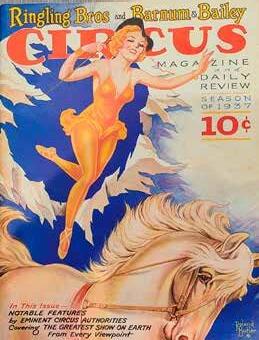
3 minute read
THE FORGOTTEN HISTORY OF THE AMERICAN CIRCUS
STORY BY Margarita Kompelmakher
Alliance Theatre’s Director of Community Partnerships and Engagement, Dr. Margarita Kompelmakher, sat down with Veronica Blair, circus historian for Water for Elephants , to discuss forgotten and unknown stories in the American circus and the stakes of remembering them today.
Margarita: What role did you play in the development of Water For Elephants?
Veronica: My job was to research Depressionera circus in America. I explored how people experienced and connected with the circus during that period, from roustabouts to elephant trainers. I also studied the life and legacies of America’s most famous elephants. I collected some unique storylines from a diverse array of performers and shared my findings with our actors, which provided texture and context in the development of their characters.
Veronica Blair
Margarita: What were the reasons that people ran away with the circus at that time?
Veronica: Circus is one of the earliest forms of popular entertainment in America. The circus used to be a day-long, large-scale event known as Circus Day. People who ran away with the circus found that they could take on a number of jobs as roustabouts, cooks, or even hoochie-coochie girls. For women with skill and ambition, running away with the circus was a path to stardom and many of America’s earliest celebrities worked in the circus. For those like the character Jacob Jankowski, who loses his parents and his livelihood, running away was an act of desperation. In the 1930s, there was a large workforce of Black-American roustabouts from the South who joined the circus because their options for work were limited.
Margarita: You’ve spoken about how the cruel treatment of animals and performers from different parts of the world is a documented part of the history of the circus in the early 20th century. Have these problems overshadowed other aspects of American circus history?
Veronica: I think so. As we distance ourselves from the problematic parts of circus culture, we forget the amazing history of the circus in this country. At one point, we had the most traveling troupes in the world. The concept of the three-ring circus was invented here; a true testament to our country’s obsession with the idea that “Bigger is Better.” We have lost sight of the fact that Circus is an art form.
Margarita: Can you talk about the significance of remembering unknown, or lesser-known, stories of the American circus in your oral history project Uncle Junior?

Veronica: I’ve been a professional aerial performer since the age of 18. Early in my career, I spent five years with UniverSoul Circus, a circus based out of Atlanta, Georgia with a large-percentage of people of color performing. Through my travels with UniverSoul, I heard all these amazing stories about Black circus performers and pioneers in the industry, but they were not in the circus history books that lined the library walls at circus institutions. I started the Uncle Junior Project as an oral history project to collect the stories of my heroes that I think the circus world should know about and that African Americans should know about. We are now in our 12th year.
Margarita: Why is Water For Elephants an important story to tell at this moment?
Veronica: The history of the American circus is at the heart of our story, with all its complexities and paradoxes. It’s a fitting backdrop for a love story. Jessica Stone and Rick Elice have created a brilliant, relatable story that will resonate with everyone. Shana Caroll’s circus direction is fresh and contemporary. The artists perform tricks in non-traditional ways, adding dimension to an already extraordinary ensemble cast. I think American audiences haven’t experienced this form of circus yet. I hope people walk away from this production with a newfound appreciation for circus arts and that they are energetic about supporting this art form in this country.
JUL 1–28 2023
Howard Logan Stillwell Theatre at Kennesaw State University
Inspired by the hilarious book by award-winning children’s book author, Oliver Jeffers.
Book by MADHURI SHEKAR
Music by CHRISTIAN MAGBY
Lyrics by CHRISTIAN ALBRIGHT
Inspired by the book THE INCREDIBLE BOOK EATING BOY by OLIVER JEFFERS
AUG 16–SEP 17 2023


Obie Award Winner — Best New Play
Described as “a rich new play, both contemplative and comic” by THE NEW YORK TIMES, English examines what opportunities are gained and identities lost when assimilating into a new culture.
By SANAZ TOOSSI
Plus many more! Tickets and memberships available at alliancetheatre.org




